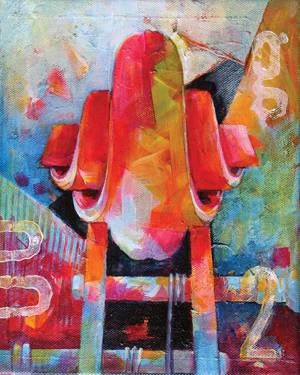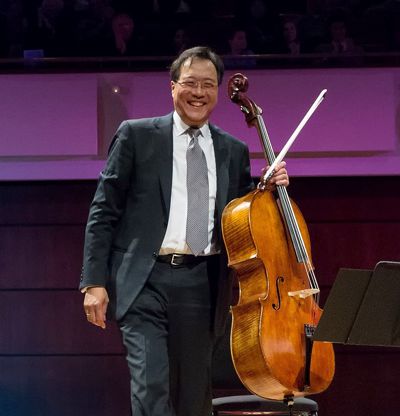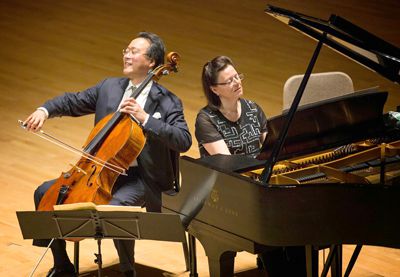Concert
Yo-Yo Ma, cello
Kathryn Stott, piano
Celebrity Series of Boston
Symphony Hall, Boston
Arc of Life Suite
J.S. Bach, arr. Gounod, Ave Maria
Jean Sibelius, Was it a dream? Opus 27, no. 4
Jacob Gade, Tango Jalousie
Claude Debussy, Beau soir
Franz Schubert, Ave Maria, D. 839
Dmitri Shostakovitch
Cello Sonata in D minor, Opus 40
Giovanni Sollima
I’ bell’Antonio, Tema III
Cesar Frank
Sonata in A Major for violin (cello) and piano

“Cello Head in Red and Blue” (2010)
With a program that began with a compendium of small dramatic pieces and emerged into a program featuring two great sonatas, cellist Yo-Yo Ma and longtime collaborator, pianist Kathryn Stott, wowed the standing room only crowd at Symphony Hall on Tuesday night.

The initial compendium of short pieces grouped under the title Arc of Life was preceded, as announced by Ma at the outset, by Après un rêve by Maurice Ravel in tribute to those lost last Friday in the Paris terrorist attacks. Its ending phrase struck called out to Song of the Birds, composed by the late great cellist and peace activist Pablo Casals.
A meditative yet romantic piece, rendered with color and feeling by both players, Après un rêve led immediately into the set which began with the Ave Maria arrangement by Gounod based on Bach’s first prelude in The Well Tempered Clavier and ended with the simple heartbreaking themes of Schubert’s version of Ave Maria.
Sandwiched in the middle, delightfully, were Sibelius’ urgent and cinematic Was it a dream?, a nuanced and varied tango written in 1925 by Danish composer Jacob Gade, and the dark and rich Beau Soir by Debussy replete with large swaths of sound.
Though challenging in some spots, the Shostakovitch sonata is generally a more lyrical and less tempestuous piece than is his noted and fantastically difficult Cello Concerto #1. Ma and Stott played it beautifully, capturing the lyricism at the outset, and the more playful, circus-like elements evident in the internal movements.
The long initial Allegro non troppo evoked urgency, filled with intense pizzicato with repeated recapitulations of the initial theme punctuated with probing, almost plodding, internal regions. The second movement Allegro conveys a seriously intense peasant dance, giving Ma’s riveting technique an opportunity to shine. Turbulent runs, up and down, yield to an earthilygruff scrubbing at the end, The Largo was wonderfully meditative and filled with a sense of the luminous, a challenging probe into the unknown. The final Allegro began with the delightfully characteristic Shostakovitch circus music followed by furiously tumbling skeins of notes that again show the master cellist’s technique to the fullest.

Kathryn Stott, piano
Photo: Robert Torres
After the intermission, the duo played a short, atmospheric, somewhat minimalist piece by the Italian composer Giovanni Sollima, born in 1962, which, after its non-unlike-Philip-Glass-nesses, wandered beautifully up to the sky at its conclusion.
The familiar and experienced duo then launched into the Franck sonata. Certainly demanding in many places, the Franck also establishes a romantic landscape rich at times with anticipations of Rachmaninoff. In its initial Allegretto Moderato, the sense of the impressionistic, of Monet fields, prevails at first before a sense of the more substantially novelistic enters the fray.
In the succeeding Allegro, a wandering sense leads into a plaintive mood, with very earnest roiling both in cello and piano developing from these. A subtle and light recapitulation yields finally to a dramatic ending that feeds right into the Recitativo-Fantasia, a heavenly, intensely sustained intervention. The final Allegretto poco mosso with its lovely flowing melody suggests a seaside town looking of an expanse, its themes bordering on pictorial swaths of vast expanses of blue.
After the first standing ovation the pair played, in honor of a couple Ma knew in the audience who were celebrating a wedding anniversary, Elgar’s wonderfully tuneful and sweet Salut d’Amour, also exhibiting a wonderful collaborative engagement between the celebrate cellist and his distinctively competent pianist.
A fantastically tuneful and jazzy showpiece, Prelude #1 by Gershwin, followed, and after that the resplendently lovely and lyrical Valse Sentimentale by Tchaikovsky, each of which drew further standing ovations.
Finally, after making warmly joking gestures about going to bed, Ma without cello and Stott emerged for their final bow.
– BADMan
Leave a Reply